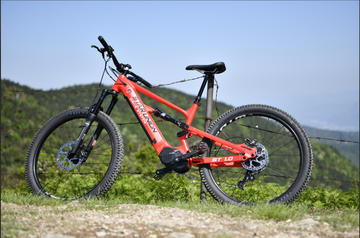The Environmental Benefits of Hydraulic Disc Brakes: A Green Cycling Choice
by RitterRuo on Feb 19, 2025

As global environmental awareness grows, more cyclists are choosing electric bikes (e-bikes), mountain bikes (MTBs), and road bikes for daily commuting and outdoor adventures. In the push for sustainable transportation, hydraulic disc brakes stand out as an eco-friendly braking solution due to their durability, low maintenance, high efficiency, and environmental benefits. This article explores how hydraulic disc brakes contribute to a greener and more sustainable cycling experience.
1. Greater Durability, Less Resource Waste
Hydraulic disc brakes are more durable than traditional mechanical disc brakes or rim brakes, leading to less frequent replacements and reduced waste.
· Less frequent brake pad replacements: The wear-resistant brake pads in hydraulic systems last longer, reducing waste from worn-out brake components.
· Longer rotor lifespan: High-quality stainless steel or alloy rotors are more durable, decreasing the production of discarded brake parts.
· Lower long-term costs: While hydraulic disc brakes may have a higher initial cost, their long lifespan makes them a more sustainable and cost-effective choice.
2. Low Maintenance, Reduced Use of Harmful Chemicals
The sealed hydraulic system requires minimal maintenance, reducing the use of environmentally harmful chemicals:
· No frequent brake cable adjustments: Unlike mechanical brakes, hydraulic systems self-adjust, eliminating the need for lubricants or constant tuning.
· Eco-friendly brake fluid: Modern mineral oil and DOT brake fluids are designed to be less harmful to the environment, with longer maintenance intervals.
· No steel brake cables to replace: Unlike mechanical brakes, which require regular steel cable replacements, hydraulic systems use fluid transmission, reducing metal waste.
3. Increased Riding Efficiency, Lower Carbon Emissions
Hydraulic disc brakes provide stronger and more efficient braking, reducing unnecessary energy loss and improving overall ride efficiency:
· Less braking energy waste: The linear braking force of hydraulic disc brakes enables smoother riding, reducing energy loss from inefficient braking.
· Lower maintenance needs: A well-maintained braking system extends the lifespan of tires and bike components, reducing waste.
· Supports zero-emission travel: Hydraulic disc brakes are commonly used on e-bikes, which produce zero emissions compared to gasoline-powered vehicles.
4. Adaptability to All Weather Conditions, Less Bike Waste
Hydraulic disc brakes perform well in rain, snow, and muddy terrain, increasing the lifespan of bicycles and reducing waste caused by brake failures:
· Better wet-weather performance: Unlike rim brakes, hydraulic disc brakes maintain strong braking power even in wet conditions.
· Consistent performance in cold temperatures: High-quality brake fluids remain effective in freezing temperatures, preventing brake failures.
· Fewer discarded bikes due to brake issues: Many bikes with traditional braking systems are abandoned due to costly repairs, while hydraulic disc brakes minimize this issue.
Hydraulic disc brakes not only provide superior braking performance and durability but also contribute to environmental sustainability. By reducing resource waste, lowering harmful chemical use, increasing efficiency, and extending bike lifespan, they offer cyclists an eco-friendly and cost-effective braking solution. If you're looking for a high-performance, low-maintenance, and sustainable braking system, hydraulic disc brakes are the perfect choice!




